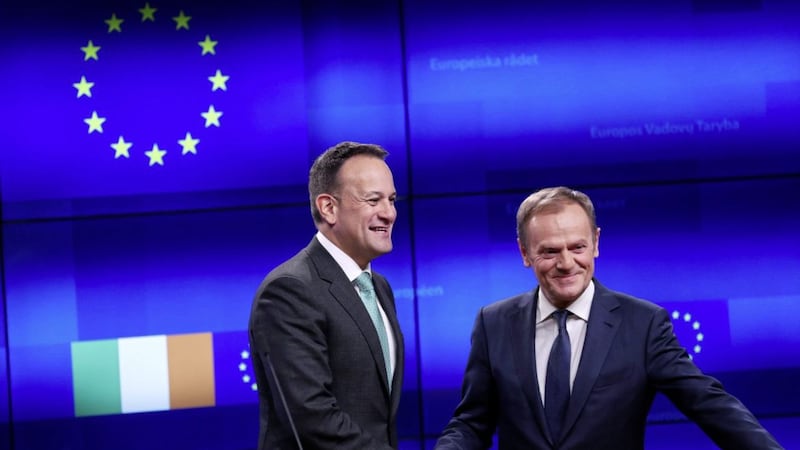IT has been quite the week, with the four unicornmen of the apocalypse tightening their grip on the reins of the Brexit fantasy as it gallops towards its inevitable and awful denouement.
Maybe the angels will yet intervene - though I can't be the only one who finds it difficult to work out who the angels are in this fiasco, much less whose side they are on.
In these straitened times, we all need a bit of escapism.
Television is, mostly, too awful to waste time on.
As if to prove my point, Sammy Wilson is, as I write, fulminating like an out-of-control firework about the "devilish euro maniac" Donald Tusk and his "trident-wielding cabal".
The DUP's chief Brexit bashi-bazouk buck eejit was responding to earlier remarks by Mr Tusk, who is the president of the European Council.
The Brexiteers aren't alone in disliking Mr Tusk. Whatever his other qualities, he seems unable to avoid appearing supercilious in much the same way that a midget can't help being short.
At a press conference in Brussels with Taoiseach Leo Varadkar on Wednesday, he said he wondered if there was a "special place in hell" for those who had "promoted Brexit without even a sketch of a plan of how to carry it out safely".
No wonder Mr Wilson, his outrage a blather but his moustache completely lucid, reacted, erm, robustly.
As TV offers no real escape from Brexit, I've instead been catching up with a bit of crime fiction.
Somehow, and unforgivably, I realised I had drifted behind in keeping pace with Andrea Camilleri's Inspector Salvo Montalbano mysteries.
Montalbano, if you haven't met him yet, is one of the most brilliant detectives in literature.
Camilleri is a beautiful writer, witty and inventive, and the books are superbly translated into English from the Italian.
No wonder Sammy Wilson, the DUP's chief Brexit bashi-bazouk buck eejit reacted robustly to Donald Tusk, his outrage a blather but his moustache completely lucid
The book I'm reading at the moment, The Pyramid of Mud, features a typically byzantine plot - at once about nothing and everything - and because it is set in Sicily, I feel like I'm offering some small solidarity with our European friends.
If consulted, Alex Kane, my colleague on the facing page, would doubtless argue that Sherlock Holmes is the detective to beat all detectives.
I wouldn't necessarily disagree. The adventures of Holmes and Watson are quite superb - their invention still dazzles more than a century on - and Sir Arthur Conan Doyle is as much a genius as his Baker Street detective.
Having mined the riches of Camilleri and Conan Doyle, my Brexit escape tunnel has brought me to the safety of GK Chesterton.
This shouldn't be a surprise, because a place can be found for Chesterton in most things that are worth doing well.
The Club of Queer Trades, a collection of short stories first published in 1905, is a sort of anti-Holmes, where Chesterton's detective's attempts at applying icy logic lead him unerringly to the wrong conclusions.
Instead, it is the detective's eccentric brother who always solve the case, with the running gag being the fact that there has been neither any crime nor criminals.
The bizarre circumstances in each story - a vicar forced to dress as a parishioner's elderly mother, a decapitated head resting on a pavement and talking to an army major who speaks in quarter-sentences, a man who makes appalling jokes at dinner parties but is regarded as the wit of London - are eventually explained by the supposed criminals being the founders of an entirely new and novel, or queer, trade.
As you will have gathered, it is all rather surreal.
Yet the preposterous pandemonium Chesterton evokes is also startlingly reminiscent of the Brexit debacle; so much for the escapism...
Besides the farce, a thread, pulled taut by the tension between fact and fiction, runs through the book.
The nature of truth is a typical Chesterton trope but one that has contemporary resonance; gazing through Brexit spectacles more than a 110 years later, it is easy to see how the fake news and unicorns created by the anti-EU enthusiasts prospered.
Early in The Club of Queer Trades, one of the characters talks about "mere" facts "like one mentioning some strange, far-off animals": "How facts obscure the truth… Every detail points to something, certainly; but generally to the wrong thing…"
During the referendum, the Irish border was ignored and we were fed 'facts' about a £350 million-a-week for the NHS and 'taking back control'.
As we're discovering, the truth of leaving the EU is rather more queer than Brexiteer fiction.









